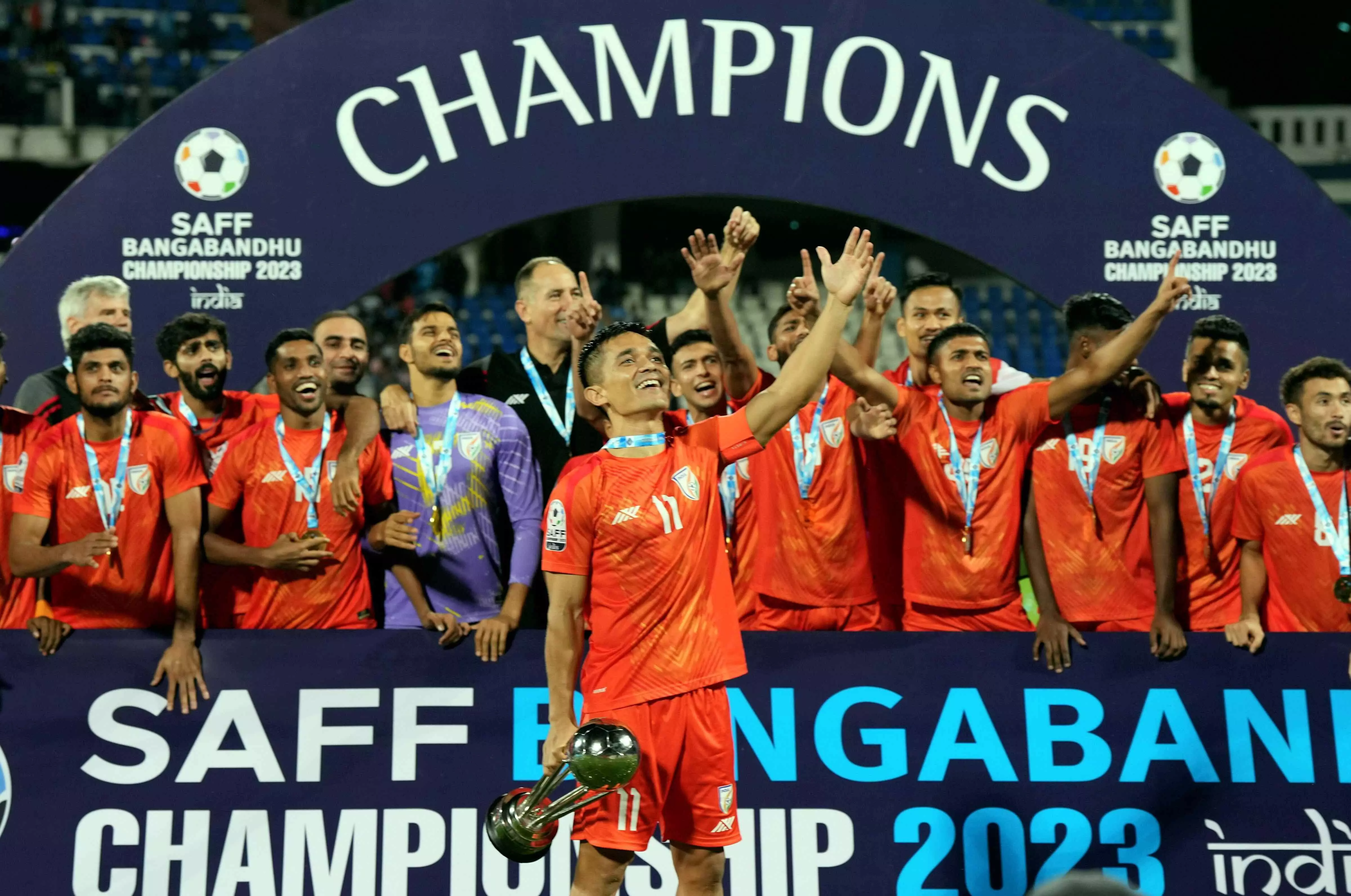A stepping stone

As the Indian football team defeated Kuwait 5-4 in a thrilling penalty shootout to clinch its record ninth title of the SAFF Championship, the Sree Kanteerava Stadium in Bengaluru erupted in glorious celebration. The loud chants of Vande Mataram from the crowd bore testimony to the immense national pride the victory invoked among football fans. In what could be called an average gameplay from both sides, it was Indian goalkeeper Gurmeet Singh’s flying save in the penalty shootout that secured the victory for India. Gurmeet had played a crucial role against Lebanon in the semi-finals as well. The victory in SAFF Championship, within a month of the Intercontinental Cup win, has certainly boosted the morale of the players and fans, who are now coming out and expressing themselves on an impressive scale. The trophy win also consolidates India’s position of dominance in the SAFF Championship, as it has won nine of the 14 editions held thus far. The exceptional performance of the Indian football team throughout the tournament, as also in the Intercontinental Cup, not only brought joy to millions of fans but also heralded a new era of hope and ambition for Indian football on the global stage. The Indian team did not lose any game across the two tournaments over the past month. Interestingly, India conceded merely two goals in nine matches played in SAFF Championship and Intercontinental Cup. While India winning a SAFF Championship is quite a staple thing, it is the new approach and the fierceness that makes the footballing nation look formidable. Credit must go to India’s head coach Igor Stimac and captain Sunil Chhetri who have not only enthused the team with a new fighting spirit but also lent a touch of novelty and depth to the strategies adopted on the ground. The recent SAFF win stands apart from the previous ones in terms of fan engagement it has generated. Not only football enthusiasts filled the stadiums in huge numbers, but they also took to social media in widespread praise and appreciation. While these attributes may not be directly linked to the game, they have become major determinants of the popularity of any sport in this age. More importantly, the novelty of India’s SAFF victory is also reflected in the emergence of new stars on the firmament. A question that has long haunted Indian football enthusiasts is, who will take the baton forward after Sunil Chhetri? The SAFF Championship 2023 journey of the Indian team has provided glimpses of the answer to the pestering question. Be it the newly-crowned AIFF Player of the Year Lallianzuala Chhangte or Naorem Mahesh Singh, Sahal Abdul Samad and Udanta Singh, among others — they have all shown promise of a better footballing future for the country. Chhetri has, for a long time, inspired younger generations, and it seems that they are moulding themselves to carry on his legacy when the time comes. But for now, Chhetri remains the brightest spot of Indian football, having improved his goals tally from 85 to 92 through June. Apart from these crucial aspects of the national team, emerging leagues are also driving in investments to lend Indian football a modern look. The establishment of the Indian Super League (ISL) and the sustained progress of the I-League have provided a platform for players to showcase their skills and attract attention from international clubs. From here on, with the heightened morale and keeping AFC Asian Cup 2024 in mind, the Indian team will regroup together for the Kings' Cup in Thailand in a couple of months’ time. The Asian Cup, to be held in January next year, will be an important tournament, as it might take India a step closer towards the far dream of playing the FIFA World Cup in future. Currently, India is ranked at the 100th position. However, despite back-to-back impressive performances, the Indian team has failed to attain a promising conversion rate. Hopefully, the coach will look into it. For the general development of the sport in the country, the Indian football authorities must continue to invest in grassroots development, improve coaching standards, and strengthen the overall infrastructure. Also, increased exposure to international competitions and friendlies against stronger opponents will help the team gain invaluable experience and further elevate their performance.



